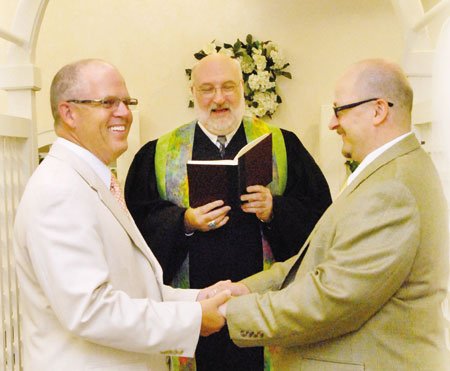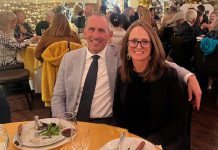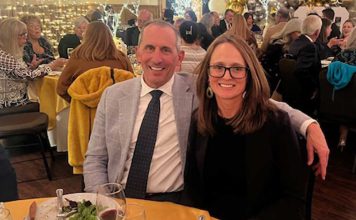”
And I now pronounce you … legally married,
”
are words that many California couples have long waited to hear,
but because they were of the same sex they were denied the
privilege.
Morgan Hill residents Rene Spring and Mark Hoffmann have been
together since July 9, 1998, 10 years next month, and were
registered as domestic partners. But when the opportunity to
legally marry came about, they wanted to take the ultimate
step.
Also with this story: a video of photo gallery.
“And I now pronounce you … legally married,” are words that many California couples have long waited to hear, but because they were of the same sex they were denied the privilege.
Morgan Hill residents Rene Spring and Mark Hoffmann have been together since July 9, 1998, 10 years next month, and were registered as domestic partners. But when the opportunity to legally marry came about, they wanted to take the ultimate step.
Full marriage rights were given to all couples when on May 15 when the California Supreme Court ruled that the state’s ban on gay marriage was unconstitutional. The victory for homosexual partners who wanted their unions formally recognized and the rights that come with such commitment came after a year of lobbying and court proceedings to defeat what the state’s high court had done in August of 2004 when it voided all 4,037 marriage licenses issued to gay couples after San Francisco Mayor Gavin Newsom began performing them in February of 2004.
Spring and Hoffmann had already exchanged rings, which a female friend they have known for years designed, but they wanted to seal their relationship in another way.
The court’s historic ruling making it possible for same-sex couples to marry went into effect June 17, and Spring and Hoffmann exchanged their vows in the Santa Clara County government center’s chapel in San Jose 10 days later.
County Supervisor Ken Yeager, who is openly gay, presided over the first same-gender marriages in the county.
Spring, 44, who was raised in Switzerland, said although he and Hoffmann, 51, were already registered as partners, being able to marry is important to them.
To register as domestic partners, a couple must file a declaration of domestic partnership with the secretary of state. The California Family Code states that once a couple is registered as a domestic partnership, the two have the same legal rights as married spouses in the event of a death, in nondiscrimination and in providing for children.
The California Supreme Court decision issued on May 15 did not invalidate or change any of the Family Code statutes relating to registered domestic partners. Couples can still register as domestic partners.
Spring and Hoffmann’s marriage, however, is threatened as are the thousands of same-sex marriages that have taken place over the past month as a ballot measure called the California Marriage Protection Act is destined for the November ballot, and ProtectMarriage.com is a leading proponent of the measure. The initiative would ban same-sex unions.
Chairman Ron Prentice said in a statement that his group seeks to define marriage legally in a traditional way.
“Our measure is very simple. It simply places the definition of marriage as being between a man and a woman in the constitution, as the courts have effectively instructed us we must do … California’s domestic partner law already affords same-sex couples every legal right that the state can grant, and our measure does not change that one bit. It simply defines marriage as tradition has always understood it to be.”
The right of same-gender couples to marry may be an issue to be discussed by churches, Spring said, but should not be an issue with state government. He said when people go to the polls in November, he hopes people will consider that his marriage to Hoffmann takes nothing away from a heterosexual marriage.
“I hope people really think about it, with an open mind and an open heart,” he said.
What happens in November won’t affect them, Spring added, but there are other couples out there that it will.
They want all couples, whether heterosexual or same gender, to make their union official.
“We’re no different, we’re as good or as bad as any other couples, we make the same mistakes, have the same joys,” Hoffmann said.
The couple doesn’t have a wild and crazy social life, nor do they seek out other gay couples.
“We just have friends, we don’t ask, when we meet someone, whether they are gay or lesbian, that isn’t what’s important,” Spring said.
Hoffmann’s two daughters were teenagers when the pair met through mutual friends. It was a challenge for Spring, he said, coming from a small family, but the teens developed a good relationship with him over time. The daughters, now in their 20s, attended the ceremony on Friday.
Hoffmann’s son was unable to attend.
“I’m very fortunate to have a good relationship with my ex-wife, she’s very understanding,” Hoffmann said.
Spring has never been married and has no children.
When the couple came together, Spring had just moved from Switzerland.
“My life changed a lot in 1998,” he said. “I moved from Switzerland to San Francisco in late March 1998, met Mark in early July, then we both moved together in early September 1998.
Mark works as mail carrier for USPS in San Jose and freelance illustrator, and Spring works as program management director for Cadence Design Systems in San Jose.
Their 10 years together in Morgan Hill have been pleasant ones, they said, describing the community as very welcoming and friendly. Spending time downtown is one of their favorite pastimes, they said.
“We walk a lot, see lots of people on our walks, we’ve never encountered any hostility, only friendliness,” Hoffmann said.
Maybe they’ve been lucky, they speculate, because there are many couples who suffer discrimination, even persecution.
“It’s not a secret that we’re a couple, we’re open and honest,” Spring said.
The misconceptions are many, they said, particularly among those who don’t think same-sex couples should be allowed to marry.
Some people believe all homosexuals are promiscuous, some believe that the whole relationship, if there is a relationship, is about sex.
“It’s about commitment and caring,” Spring said. “We’re like any other couple in that respect.”
And the wild parties, the club-hopping and partner-swapping?
“Honestly, we’re boring,” said Hoffmann. “That’s not us at all. We stay at home, we take walks, we go downtown … We don’t have parties, really, sometimes family and a few friends, but not very often.”














